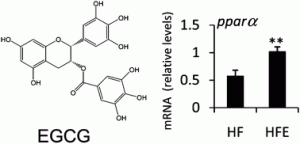A team from The Pennsylvania State University have shown that one of the major polyphenols in green tea, (–)-Epigallocatechin-3-gallate (EGCG), increases the expression of genes related to fat oxidation. EGCG has been show to prevent the development of obesity in rodent models and may also modulate body weight in humans. Mechanisms accounting for this effect that have been demonstrated include a decrease of fat absorption in the small intestine and modulation of genes related to lipid metabolism in the liver, white adipose tissue and skeletal muscle; although in the latter tissue, comparatively little is known.
 Joshua D. Lambert and co-workers investigated the expression of several genes related to lipid oxidation in the skeletal muscle of high fat-fed mice. They also compared these changes to observed effects on physiological markers of obesity, type II diabetes and obesity-related fatty liver disease (ORLFD).
Joshua D. Lambert and co-workers investigated the expression of several genes related to lipid oxidation in the skeletal muscle of high fat-fed mice. They also compared these changes to observed effects on physiological markers of obesity, type II diabetes and obesity-related fatty liver disease (ORLFD).
Results showed that high fat-fed mice treated with EGCG had reduced body weight gain and final body weight compared to high fat-fed controls. EGCG treatment also decreased fasting blood glucose, plasma insulin, insulin resistance and markers of ORFLD. The expression of mRNA from genes relating to mitochondrial fatty acid oxidation was increased as was the levels of fat in the excretion. Taken together, these results suggest that EGCG modulates body weight gain by modulating both lipid metabolism and fat absorption.
 So, it may be that drinking green tea could help with those new years resolutions to shed a few pounds; however, you’ll have to drink a lot as the levels used in this study correspond to a human consumption of approximately 10 cups a day!
So, it may be that drinking green tea could help with those new years resolutions to shed a few pounds; however, you’ll have to drink a lot as the levels used in this study correspond to a human consumption of approximately 10 cups a day!
Interested in knowing more? Read the full text here.
(−)-Epigallocatechin-3-gallate increases the expression of genes related to fat oxidation in the skeletal muscle of high fat-fed mice
Sudathip Sae-tan, Kimberly A. Grove, Mary J. Kennett and Joshua D. Lambert










